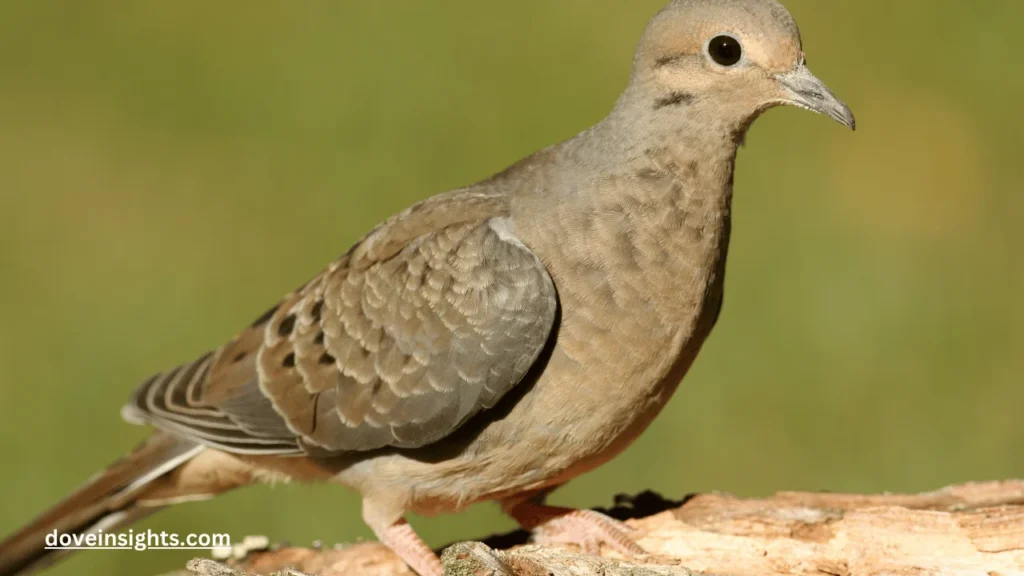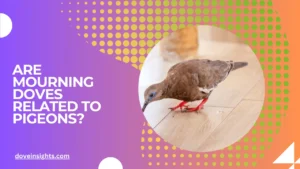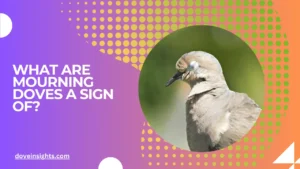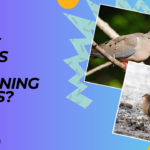At first glance, mourning doves might seem like simple, serene creatures.
Their soft coos and graceful flight patterns evoke an image of peace and tranquility, often making them symbols of harmony. But beneath their calm demeanor, one might wonder: Are mourning doves as smart as they appear?
While they may not be the flashy, talkative types like parrots, mourning doves possess remarkable survival skills and behaviors that suggest they are more intelligent than we often give them credit for.
In this article, we delve into the cognitive abilities of mourning doves, exploring their learning capacity, problem-solving skills, and how their intelligence plays a crucial role in their survival.
Contents
The Cognitive Abilities of Mourning Doves
When discussing the intelligence of mourning doves, it’s important to first understand their basic cognitive functions. Mourning doves, like many birds, have relatively large brains in proportion to their size, which allows for complex behaviors.
Though they do not possess the same problem-solving skills or ability to use tools as some of their avian cousins, such as crows or ravens, mourning doves exhibit impressive spatial awareness and memory.
They are able to navigate vast distances during migration and remember locations of food sources, indicating strong spatial memory.
These abilities are essential for survival, especially when it comes to finding shelter and avoiding predators. Their ability to recognize familiar faces and adapt to new environments shows a level of intelligence that allows them to thrive in urban and suburban settings, despite being largely solitary and elusive creatures.
Mourning Doves and Problem-Solving: Are They Quick Learners?
While mourning doves may not solve puzzles the way some birds like pigeons do, they still exhibit problem-solving behavior when necessary. In many cases, these birds display adaptive learning when they face new challenges.
For instance, mourning doves are known to find innovative ways to access food when traditional methods fail, such as using fence posts or branches to perch on while eating.
Their learning ability is often tied to their need to survive, whether that means avoiding predators or finding food in urban settings.
Studies have shown that mourning doves, when presented with new challenges in controlled environments, can learn to adapt their behaviors—often choosing the most efficient paths to find food or seek shelter. This type of adaptive learning is a key indicator of their intelligence.
Communication and Social Behavior: An Insight into Their Smarter Side
Although mourning doves are typically solitary, they do engage in social behaviors during breeding season.
Their communication skills, while not as complex as those of some other bird species, still reveal their ability to interact and coordinate with each other. Their cooing sounds, which are often heard during mating rituals, are a form of communication that helps maintain pair bonds.
Interestingly, mourning doves also migrate in flocks, which suggests that they are capable of some level of cooperation. In these flocks, the birds often rely on one another for protection and guidance, indicating that mourning doves have a social intelligence that allows them to adapt to living in groups when necessary.
This ability to interact with others and work together for survival is an essential part of their behavioral intelligence.
The Role of Mourning Doves’ Intelligence in Survival
Mourning doves may not be known for using tools or exhibiting advanced problem-solving, but their intelligence is critical for survival.
One of their most impressive abilities is their flight navigation. Mourning doves can cover vast distances while migrating and have an acute sense of direction, which they rely on to find food, mates, and safe locations.
This ability requires a sophisticated memory and keen awareness of the environment around them.
Additionally, mourning doves are highly alert to their surroundings. They can quickly detect predators and adapt their behavior accordingly, whether it’s by hiding in foliage or taking flight.
Their ability to respond quickly to changes in their environment shows a high level of situational awareness, an essential form of intelligence that is directly tied to their ability to survive in both urban and rural areas.
Comparing Mourning Doves to Other Birds: Are They Less Intelligent?

When comparing mourning doves to other bird species, it’s important to understand that intelligence in the animal kingdom is multifaceted. While mourning doves may not be as socially complex or adept at problem-solving as parrots, crows, or ravens, their intelligence is specialized for their specific lifestyle and needs.
Their survival skills—such as navigation, predator detection, and adaptation to environmental changes—demonstrate that mourning doves are not lacking in intelligence; rather, they excel in areas that ensure their continued existence.
In fact, the mourning dove’s intelligence is often underrated because it doesn’t fit into the typical categories of learned tricks or complex behaviors.
Their instinctual intelligence, developed over generations, allows them to thrive in a wide range of habitats, making them a true testament to the adaptability of birds in general.
Conclusion:
In conclusion, mourning doves may not be the first species that comes to mind when you think about bird intelligence, but their cognitive abilities are far from basic.
From their remarkable memory to their ability to adapt to ever-changing environments, mourning doves possess a unique form of intelligence that ensures their survival. While they may not perform complex tasks or exhibit advanced social behaviors, their instinctual smarts are critical to their existence.
Whether navigating vast distances or avoiding predators, mourning doves display an intelligence that is perfectly suited to their way of life.
FAQ’s
Are mourning doves intelligent?
Yes, mourning doves exhibit intelligent behaviors such as adaptive learning, navigation, and predator detection, all of which are essential for their survival.
Can mourning doves learn new behaviors?
Mourning doves are capable of adaptive learning, especially when it comes to finding food and avoiding danger. Their ability to adjust to new challenges shows a level of intelligence.
How do mourning doves communicate with each other?
Mourning doves primarily communicate through cooing sounds, which are used during mating and to maintain pair bonds. They also have a keen sense of body language.
Do mourning doves have good memory?
Yes, mourning doves have a strong memory, particularly when it comes to remembering locations of food sources and places to hide from predators.
Mourning doves are generally solitary but can form flocks during migration or when breeding. Their social intelligence helps them cooperate and stay safe in groups.
Do mourning doves migrate?
Yes, mourning doves are migratory birds and can travel long distances during seasonal migrations, using their spatial memory and directional sense to navigate.








